by Tom Watson.
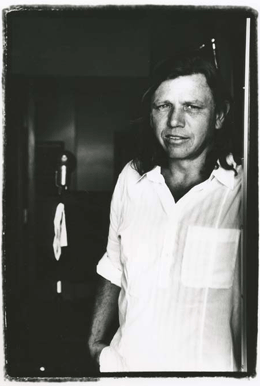 |
|
Kevin Shirley (2007). Photo by Ross Halfin. |
Though he claims the nickname Caveman is the result of a physical resemblance, odds are the moniker has much to do with the fact that Kevin “Caveman” Shirley spends quality time in dimly lit recording studios producing, engineering, or mixing the likes of Led Zeppelin, Iron Maiden, Metallica, Dream Theater, and, since 2006, Joe Bonamassa.
On August 20, 2007, Premier Artists (US) and Provogue Records (Europe) will release Bonamassa’s seventh solo studio album, Sloe Gin, for which Shirley served as both producer and mixer. While the actual role of record producer is often nebulous and, especially in the case of a seasoned recording artist, logistic or simply titular, Joe Bonamassa is quick to point out that Shirley’s contributions to Sloe Gin are concrete, serious, and artistic. “It’s unbelievable,” Joe says in a pre-release one-sheet, “he takes my vision, augments it, and brings it further than I ever would have thought to.”
The Bonamassa-Shirley association began with 2006’s successful (the album debuted in the number one slot on Billboard‘s blues chart) You & Me with Shirley donning the hats of producer, engineer and mixer. The sonic quality of You & Me outshines Bonamassa’s previous studio releases and many other entries in the blues-rock genre in general. If Joe Bonamassa’s goal with You & Me was to expand his range and audience, it’s doubtful he could have found a better associate than Kevin Shirley.
Sloe Gin builds on the foundation laid by You & Me and features Bonamassa stretching his legs as a vocalist and multi-genre musician through unique stylistic blendings. But, while the heart of the album is Bonamassa’s ever-growing musicianship, the effective delivery of his talent has much to do with the high production value brought to the table by Kevin Shirley who has an ear for arranging and mixing hard, classic, and heavy rock that is second to none.
Born and raised in South Africa, Shirley now lives in Malibu, California, a few miles away from what must seem to him a second home, The Document Room, a small studio overlooking the Pacific Ocean that features two big boards (a Neve 8068 MK-1 and Shirley’s weapon of choice, an SSL XL 9000 K) and a client list ranging from U2 and Metallica to Justin Timberlake and Britney Spears. It was at The Document Room that Bonamassa and Shirley brewed their batch of Sloe Gin.
Guitar International spoke with Kevin Shirley about Sloe Gin on August 1, 2007, while Shirley was in London’s Metropolis Studios putting the finishing touches on the upcoming Led Zeppelin releases Mothership (a 24-track CD “best of” with titles selected by Jimmy Page, Robert Plant and John Paul Jones) and a remastered DVD of Led Zeppelin’s The Song Remains The Same concert.
Tom Watson: The Document Room – what a great place to record.
Kevin Shirley: (Producer) J.T. Meskiel put it together in his home for his private projects. I was headed back to Australia and on the way I stopped by Malibu and somebody asked me to do a re-mix and I found Meskiel’s studio. In about a week I told him I really love the place and he said I should talk to the realtor he bought the house from. I met her and said I’d like a place that’s close to the beach, off the beaten track, and five miles or so from the studio. She found me an amazing home and I moved to Malibu.
TW: I see that Eddie Kramer’s been associated with the studio.
KS: He was involved with some of the original design features but he hasn’t worked out of there too much. I’ve kind of like been “the client” there.
TW: Must feel like home by now.
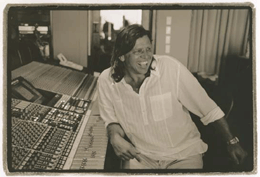 |
|
Kevin Shirley (2007). Photo by Ross Halfin. |
KS: They treat me really well. In fact, they’re expanding. We mixed Metallica there, which was a huge project for the studio. We mixed Metallica in Surround Sound on what was essentially a very good home studio.
TW: Is Surround Sound the reason why you like the SSL K so much?
KS: I like the SSL K because it’s versatile, really. I can make it work for most things. I generally don’t do a lot of stuff in the mix anyway. So, once I’ve recorded a thing I’m pretty much ready to run it down. I sort of set the mix up as I’m going and I just run it down at the end of the day. It’s never a “you need to re-mix” situation.
TW: How many sessions went into making Sloe Gin?
KS: We went into the studio in January (2007). We had ten days planned and Joe definitely had only ten days between gigs he was doing so we slotted them in. The idea at the time was to do an acoustic album, which sounded like a fine idea, but as we got into it, especially when we got to “Ball Peen Hammer”, I’m like, “there’s more that we can do with these songs.” We did “Around the Bend,” and that made sense, then we did “Richmond” and that made sense too. When we got to “Ball Peen Hammer” it started feeling like we weren’t necessarily maximizing things. But that first session’s where “Jelly Roll” and the acoustic things came from – we cut them all at that time.
Then we had a conversation and I’m asking why are we doing it all acoustic? Turned out to be something like a budget thing – an acoustic album in between two big albums. I thought that didn’t make any sense at all, especially on the heels of You & Me, which like tripled Joe’s record-buying audience. No one’s going to take the next album (after You & Me) and go “this is just a fine stop-gap album.” If you’re paying full fare for it, it’s got to be a regular album. So, Joe’s very good and he trusts me with all that stuff and we went back into the studio in April and we did another week and cut the rest of the electric or acoustic-electric tracks, like “Sloe Gin,” “Dirt in My Pocket” and “Another Kind of Love.”
TW: The acoustic-electric approach worked very well.
KS: It’s great. Very Led Zeppelin-y.
TW: What prompted you to bring in the Bova Orchestra?
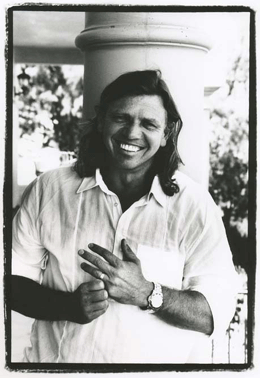 |
|
Kevin Shirley (2007). Photo by Ross Halfin. |
KS: I’ve known (Jeff) Bova for years. Jeff is a one-man orchestra. He orchestrates everything himself, he’s got like this spaceship he works in. He did one of the Zorro movies (soundtrack) by himself. He pretty much records one violin at a time. He’s got a bank of these things and he plays the whole lot himself with his computers and his synthesizers. The guy’s amazing. He’s done orchestrations for all sorts of people – like Meatloaf and some Iron Maiden stuff for me when we used an orchestra. I’ve known him for years, so I gave him a call and said, “Jeff we need a favor. We’re not working with a huge budget but I want an orchestra,” and he goes, “No problem.”
TW: Joe’s voice on Sloe Gin is extremely up-front and present. It struck me like “we’re so confident in Joe’s voice now, let’s really let people hear what he can do.” Is that what was going on?
KS: A little bit of that is going on, beginning with You & Me as well. When I first gave a listen to Joe’s records I wasn’t that taken with his voice. I thought he wasn’t as strong a singer as he could be. So, when we got into working on the album (You & Me) I kind of figured we were working with a great (guitar) gunslinger whose voice wasn’t up to the same level, which is kind of why I brought the other singer in on “Tea for One” – Doug (Henthorn) was a great singer and Joe was a good singer.
But, I have to say, I was absolutely surprised while we were working on You & Me at the quality of Joe’s voice. I was really pleased with the consistency of his voice and that he really can deliver. Sometimes he’s a little worn out from playing his 250 dates a year, but he’s a very good singer.
So, when we were in the studio this time (Sloe Gin), and The Document Room is such an intimate place anyway, it was just the two of us and we could get into getting the vocal deliveries right. It wasn’t “are we going to get a vocal good enough for the track,” it was like we’ll keep going until it’s right. And, honestly, he’s great. He can sing three or four tracks in a row and it sounds the same, each track equally good.
TW: Joe’s vocals seem to have even more presence than they did on You & Me. Was there a change in the way Sloe Gin was recorded from You & Me?
KS: I think a lot of the difference comes from the fact that is was a more intimate session. It was just me and Joe in a house (The Document Room), whereas, You & Me was me and Joe and a band in a hotel in the middle of Las Vegas. It’s a whole different head space. (When recording Sloe Gin) Joe would come up to the house in the morning and it was like, “You have to sing soon, so here, have a cup of tea, warm your throat up, and let’s get into it.” With just two people it’s much more of a conversation than theatrical stage direction.
TW: Plus, by Sloe Gin, you have a better relationship from having worked together.
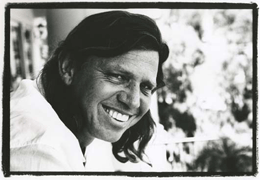 |
|
Kevin Shirley (2007). Photo by Ross Halfin. |
KS: That’s right. And I think he trusts me now. We took a lot of chances on You & Me. When you compare how the tracks came in with how they went out you can see how much of a leap it really is. He says in the liner notes to You & Me, “Thanks for making me think outside the box.” We were definitely pushing the boundary forward compared to the way Joe was thinking. For example, when we cut that track, “Django,” he kind of had to trust me on that. I told him, “Find the melody, just go in the studio by yourself, no drums or anything, and play the melody, develop it, bend it, take your time with the notes. Let’s just feel this melody. Then you play this melody with the band.” So, there’s a lot of growth that happens and a lot of trust that happens.
Initially, I guess, you’re a little apprehensive, but when you see that it’s working, and when you take these things and see that they work on stage as well, the trust develops. With this album (Sloe Gin) there was a lot more trust. It’s almost like he’s my little brother, actually, and that’s a cool kind of relationship as long as there’s respect.
TW: Let’s talk about the title track, which I understand you brought to the project.
KS: I originally tried “Sloe Gin” with someone else singing the vocals, the same guy that sings “Tea for One” on You & Me (Doug Henthorn). There’s a profanity in the lyrics as originally written and Joe does so much work with kids in schools that, although he loved the song, he said he didn’t want to make it difficult for families to listen to the material – “I’m all about bringing blues to the schools, bringing blues to the kids and I need to be a little more accessible.” You need to be able to buy it at K-Mart, which you couldn’t do with the profanity on it. Wal Mart won’t stock a title if it has profanity. You have to make cleansed versions for them. The whole thing’s gotten kind of politically correct. We ended up softening one word in the lyrics for Joe’s version.
Michael Kamen and Bob Ezrin wrote “Sloe Gin” for Tim Curry back in the ’70s for his album Read My Lips, which of course I had, back in the day. You can’t readily find it now. You can find MP3s here and there, but it’s not easily accessible any more.
TW: A few of the tracks on Sloe Gin are covers of relatively obscure songs. How were they brought to the project?
KS: Joe brings all those things, to be honest. On the first album (You & Me) there’s a version of “So Many Roads,” the Otis Rush classic track. It’s the first track I ever cut with Joe. I had pulled together this band with Jason (Bonham – drums), Carmine Rojas on bass and Rick (Melick) on keyboards, some of the guys that are in his band now, to back him up because I didn’t think his band was quite up to elevating him to the next level where I thought his playing could take him. When Joe brought the Otis Rush track in there was no plan to include it on the album and we cut it just to warm up, set the record levels, and get to know each other, but it came out so good that I insisted we keep it for the album. But, other than “Sloe Gin,” Joe brings the songs. He digs around and looks for them.
TW: Joe says that with Sloe Gin you and he bettered You & Me. Agree?
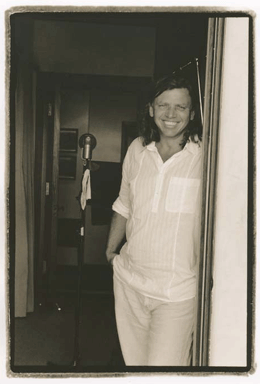 |
|
Kevin Shirley (2007). Photo by Ross Halfin. |
KS: I had never thought about that and I was surprised to read it because I think they’re all part of something. I think it’s better in that it embraces more than just blues. When you talk about his voice coming out and the acoustic tracks, a lot of the spotlight is taken off the fretboard. The emphasis is just on the artist, the song, just on Joe. It’s not designed to be anything in particular, it’s just a collection of Joe’s songs and the way we’ve done them. I actually wondered about whether we had enough guitar solos, but, I think we’re fine.
I’m glad Joe thinks it’s better. I love both albums and think they’re both great. I love the different feel on the two records, the feel of Jason (Bonham, drums) on You & Me and the different feel of Anton Fig (drums) on Sloe Gin, which also dictated a different direction in the swagger Joe has in his playing.
I think he might also feel that this record’s better because he’s just much more comfortable on this album. He’s comfortable with these songs. There’s actually some great guitar playing on this album, like the acoustic stuff on “Ball Peen” and others. I think one of the things that’s interesting about Sloe Gin is it’s Joe stepping out of the shadow of being that gunslinger. What’s coming out is a mature singer and an all-around musician. He pays homage to the blues, a lot, and he builds around it and is definitely centered on the blues, but he’s not tied down by the craft of the 12-bar structure of the blues like nothing else is going to work.
We plan on doing a live album toward the end of the year and I think what we’re going to get is the best of the songs from the last couple of albums and we’re going to get the guitar gunslinging as well. So, I think that the live album and the gigs that he plays will have enough guitar playing to suit anybody
TW: The last track, “India,” with its Eastern flavor – is this a taste of things to come?
KS: We’ve been talking about different ideas, like that, actually. We’ve been talking about taking the blues around the world and experimenting with different genres all on one album with a blues base. That’s a conversation we had as recently as this week.
 |
|
Kevin Shirley |
Related Links
Joe Bonamassa Talks about Sloe Gin
CD Review: Sloe Gin by Joe Bonamassa
Caveman Productions (Kevin Shirley’s website)
Caveman! (Kevin Shirley’s blog)
The Document Room
Joe Bonamassa’s official website
Joe Bonamassa on MySpace
Joe Bonamassa interview on Guitar International
Brian D. Holland’s review of You & Me
Brian D. Holland’s review of Live at Rockpalast
Brian D. Holland’s review of Signature Sounds, Styles, and Techniques
Solid State Logic’s XL 9000 K Series recording console
More articles by Tom Watson